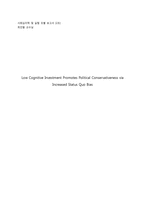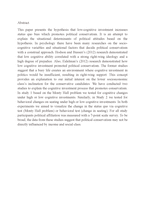Conservatism
Status quo bias
Low Cognitive Investment
가설
연구 1
연구 2
논의(general discussion)
한계 및 제언
Reference
This paper presents the hypothesis that low-cognitive investment increases status quo bias which promotes political conservatism. It is an attempt to explain the situational determinants of political attitudes based on the hypothesis. In psychology there have been many researches on the socio-cognitive variables and situational factors that decide political conservatism with a construal approach. Hodson and Busseri’s (2012) research demonstrated that low cognitive ability correlated with a strong right-wing ideology and a high degree of prejudice. Also, Eidelman’s (2012) research demonstrated how low cognitive investment promoted political conservatism.
Eidelman, S., Crandall, C.S.(2009), A Psychological Advantage for the Status Quo, Social and Psychological Bases of Ideology and System Justification, edit. by Jost, J.T., Kay, A.C., Thorisdottir, H., Oxford University Press
Eidelman, S., Crandall, C.S., Goodman, J.A., Blanchar, J.C.(2012), Low-Effort Thought Promotes Political Conservatism, Personality and Social Psychology Bulletin, 20(10)
Gross, N.(2013), Why are professors liberal and why do conservatives care?, Cambridge: Harvard University Press
Hodson, G., Busseri, M. A.(2012), Bright Minds and Dark Attitudes – lower cognitive ability predicts greater prejudice through right-wing ideology and low intergroup contact, Psychological Science, 23(2)
Jost, J.T., Hunyady, O.(2002), The psychology of system justification and the palliative function of ideology, European Review of Social Psychology, 13
Jost, J.T., Glaser, J., Kruglanski, A.W., Sulloway, F.(2003), Political conservatism as motivated social cognition, Psychological Bulletin, 129
Kahneman, D., Knetsch, J.L., Thaler, R.H.(1991), Anomalies: The Endowment Effect, Loss Aversion, and Status Quo Bias, The Journal of Economic Perspectives, 5(1)
Lakoff, G.(2004), Don’t Think of an Elephant: Know Your Values and Frame the Dabate, Chelsea Green Publishing
McClosky, H.(1958), Conservatism and Personality, American Political Science Review, 52(1)
Samuelson, W., Zeckhauser, R.(1988), Status Quo bias in Decision Making, Journal of Risk and Uncertainty, 1
Wilson, G. D.(1973), A Dynamic Theory of Conservatism as Uncertainty Avoidance, The Psychology of Conservatism, Oxford: Academic Press
Zhong, C.-B.,Magee, J.C. ,Maddux, W.W.,& Galinsky, A.D. (2006). Power, Culture, and Action: Considerations in the Expression and Enactment of Power in East Asian and Western Societies, in Ya-Ru Chen (ed.) National Culture and Groups (Research on Managing Groups and Teams, Volume 9), Emerald Group Publishing Limited.























 분야
분야


